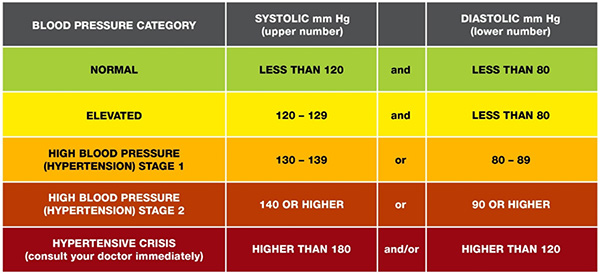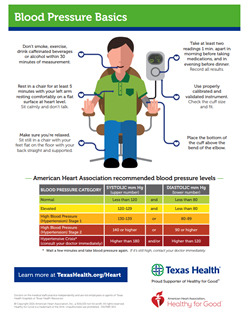Blood pressure is the force that moves blood throughout the body, delivering nutrients and oxygen to cells that allow your lungs, heart and muscles to function properly.
Maintaining a healthy blood pressure is important for overall health. High blood pressure, also called hypertension, can damage the body in many ways and has been linked to higher risk of coronary heart disease, heart failure and stroke.
Nearly half of U.S. adults have high blood pressure, which is known as a “silent killer” because most of the time it has no obvious symptoms. Left untreated, damage builds up over time, weakening the heart and the vessels that carry blood, as well as other organs such as the brain, kidneys and eyes.
But it is possible to control high blood pressure and take steps to improve your quality of life and reduce the risk of associated health problems.
“In general, most patients are asymptomatic,” says Dr. Justin Martin, a cardiologist at Texas Health Heart & Vascular Specialists, a Texas Health Physicians Group practice in Fort Worth. “That’s the challenge. A similar thing happens with diabetes. People can have some symptoms, but a lot of people are completely asymptomatic while their blood sugar is elevated. It’s also the same thing with cholesterol. You don’t feel cholesterol building up in your body.”
Blood pressure readings reflect the amount of pressure against blood vessels both when the heart beats and between beats. The top number of your blood pressure, called systolic pressure, is higher because it measures the force when the heart beats. The bottom number, called diastolic pressure, is lower because it measures the force between beats. These numbers are measured in millimeters of mercury (mmHg).
“The systolic and diastolic numbers in general are equally important,” Martin says. “That difference between the top and the bottom, if it’s wide, is a risk factor for future congestive heart failure.”
The only way to know your blood pressure is to take a reading. A diagnosis of high blood pressure must be confirmed with a medical professional.
“A blood pressure reading is not a static, one-time measurement,” Martin explains. “One measurement in a physician's office does not equate to a diagnosis of hypertension. We want you to be measuring your blood pressure not only in your physician’s office, but also at home because it's going to vary based on the time of day and other things going on in your life.”
The American Heart Association recommends home monitoring for all people with high blood pressure — using an automatic, cuff-style bicep monitor — but not as a substitute for regular visits to a health professional.
Normal blood pressure is below 120/80 mmHg. If you're an adult and your systolic pressure is 120-129, and your diastolic pressure is less than 80, you have elevated blood pressure. High blood pressure is a systolic pressure of 130 or higher, or diastolic pressure of 80 or higher, that stays high over time.

A number of factors — some controllable, others not — affect your risk of developing high blood pressure. Among the modifiable risk factors are being overweight or obese; having a poor diet; smoking, vaping or being exposed to secondhand smoke; having high cholesterol, diabetes or sleep apnea; and a sedentary lifestyle.
Of all the modifiable risk factors, Martin says improving diet may be the one that can deliver the quickest benefit. He suggests that people at risk of high blood pressure adopt the DASH diet — short for Dietary Approaches to Stop Hypertension — which includes low-sodium foods and those high in potassium and other nutrients.
“It’s a low-sodium diet with fruits, vegetables and whole grains that matters,” Martin says. “Getting rid of processed foods and saturated fat can lower the blood pressure an average of 10 points. Clearly other things are important: exercise, not smoking, limiting alcohol, getting proper sleep and treating sleep apnea. But probably our diet is going to end up being the most powerful.”
Non-modifiable risk factors are your race, age, sex, family history and conditions such as chronic kidney disease. Knowing family history is important, Martin adds, because the sooner you know your risk of developing high blood pressure, the sooner you can make lifestyle changes.
“We all know where our families went on vacation, but we don’t necessarily know their health history,” he notes. “Just by being related to these individuals that we spend Thanksgiving and Christmas with, we also share genetic predisposition for certain diseases. It’s important to share that information because obviously the main goal in the field of cardiovascular disease is prevention.”
If you are diagnosed with high blood pressure, treatment may include lifestyle changes plus medication, including diuretics, also called “water pills,” which reduce the amount of sodium in the body through urination. Other classes of medication cause hormonal, chemical or muscular changes to lower blood pressure or decrease the heart rate.
Managing blood pressure becomes even more important as you age, according to Martin, because blood vessels grow stiffer over time — and because hypertension increases risks posed by other health problems.
“Of all the modifiable risk factors for cardiovascular disease, hypertension is the leading cause of years of life lost around the world,” he points out. As your cardiovascular disease risk increases with age, when you add in risk factors like high blood pressure plus high cholesterol, or high blood pressure plus diabetes, or high blood pressure plus cigarette use, the risk is multiplied. It’s exponential.”
The AHA recommends you take an active role in managing your blood pressure by asking about your readings at your annual checkups, knowing your numbers and keeping track of your medications.
“It’s really important to speak up to your doctor and ask questions,” Martin says. “We love to talk to people about their health. The doctor’s office is a place where you should feel very comfortable, and if you don’t, you should get a different doctor.”
If you suspect you're at risk for or may have high blood pressure, find a heart and vascular specialist today or take our heart health assessment.


